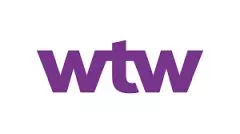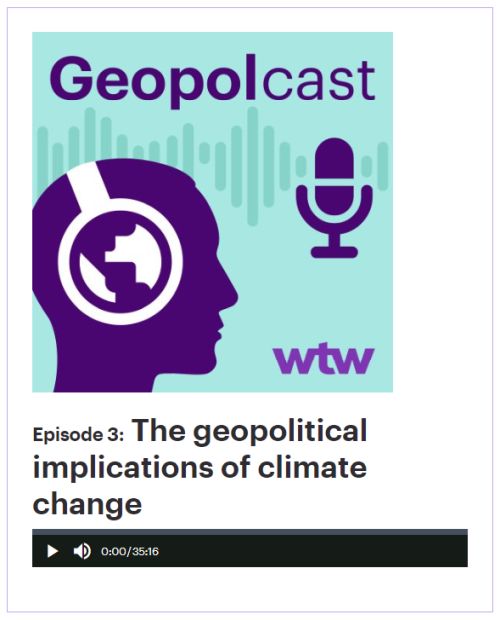An informative podcast series that explores geopolitics and its impact.
About WTW's Geopolcast
Welcome to Geopolcast, a thought-provoking podcast that looks at the world's most pressing geopolitical issues, analyses global trends, and brings expert interviews that provide fresh perspectives on the ever-changing landscape of international politics. Stay informed, stay engaged.
This summer we saw Europe experience an unprecedented heatwave, the worst heatwave since records began. Added to this, we have seen an increasing number of devastating wildfires, and Beijing has seen its worst flooding in 140 years. Not only is the impact of climate change causing devastation in countries ranging from Ethiopia to Pakistan, but the further implications of climate change will also create secondary challenges including poor harvests and migration flows.
In this episode of Geopolcast, Elisabeth Braw, senior fellow at the American Enterprise Institute, discusses the implications of climate change with Lieutenant General Richard Nugee, Non-Executive Director of Climate Change and Sustainability at the UK Ministry of Defence, and Helene Galy, the Managing Director of WTW's Research Network.
"The uncertainty and difficulty to quantify the security impacts of climate change, and in particular the material impact on the company's business model, their customers and their employees, shouldn't stop companies trying to grasp what is relevant."
Helene Galy
Speakers
Elisabeth Braw
Resident fellow at the American Enterprise Institute (AEI)
Elisabeth is a Geopolitics expert who has been consulting with
the WTW Research Network since 2019, specifically
exploring grayzone aggression and looking at its implications for
risk managers. This work forms part of a wider research programme
on geopolitical risk, including the importance of China and
security impacts of climate change.
Elisabeth is a resident fellow at AEI, where she focuses on defense
against emerging national security challenges, such as hybrid and
grayzone threats. Concurrently, she is a columnist with Foreign
Policy, where she writes on national security and the globalized
economy, and is a member of the National Preparedness Commission
(UK).
Managing Director of WTW Research Network.
Hélène joined Willis in 1998, specialising in natural hazard modelling and reinsurance optimisation. Since 2001, she has been leading multi-disciplinary teams, who research, design and develop analytical solutions and insights for risk identification, quantification and management. She currently leads the Willis Research Network, an award-winning public-private partnership, which harnesses over 60 science partners to form innovative long-term collaborations, improving our understanding of risks (natural hazards, technological risks, geopolitical drivers of risk) for the benefit of clients and society: using science to support resilience.
Hélène has extensive experience in spatial modelling, design of innovative solutions, and applying science to business challenges. Her current focus is on Climate advisory services (advising corporates on how leading-edge climate research can help them quantify their exposure to climate variability and climate change; exploring the links between climate change and national security) and on People Risks (how people can increase vulnerability or improve resilience: terrorism, societal resilience to systemic risks, including pandemics).
She holds a BSc in Economics & Political Science (Sciences Po), and an MSc in Environmental Economics (UCL).
The content of this article is intended to provide a general guide to the subject matter. Specialist advice should be sought about your specific circumstances.



